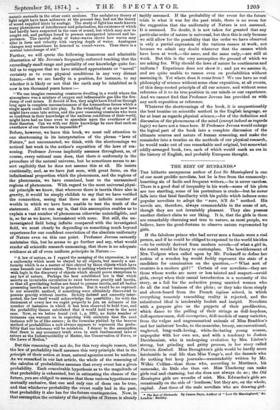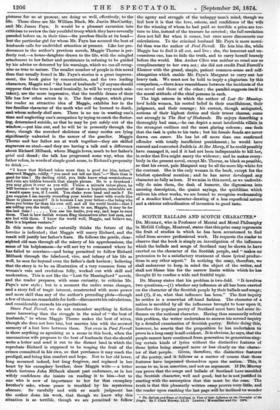THE BEST OF HUSBANDS.*
THE hitherto anonymous author of Lost Sir Massingberd is one of our most prolific novelists, but he is free from the commonly. besetting Bin of facile and frequent writers,—he is never careless. There is a good deal of inequality in his work—some of his plots are too startling, some of his portraiture is crude—but he never falls into that fatal familiarity with his public which induces some popular novelists to adopt the "sure, it'll do" method. His novels are, therefore, always commendable in the sense of art, though they are not invariably pleasant. They also possess another distinct claim to our liking. It is, that the girls in them are remarkably charming and true to nature, as most people, we believe, have the good-fortune to observe nature represented by girls.
If the fabulous prince who had never seen a female were a real person, and if he could be obliged to expound to the world his idea —to be entirely derived from modern novels—of what a girl is, the result would be funny to contemplate. The bewilderment of Mrs. Todgers when called upon by Mr. Pecksniff to define her notion of a wooden leg would feebly represent the state of a candidate for examination on the question,—" What sort of creature is a modern girl?" Certain of our novelists—they are those whose works are more or less tainted and suspect—avoid girls, except when their casual introduction is a necessity of the story, as a foil for the seductive young married women who do all the real business of the plots ; or they take them simply and above-board from the French ingenue school, in which everything remotely resembling reality is rejected, and the suhstituted ideal is intolerably foolish and insipid. Novelists with a purpose give us the puppets of their predilection, which dance to the pulling of their strings as doll-hoydens, doll-sportswomen, doll-incomprises, doll-models of many varieties, from the vulgar and ungrammatical animals of Miss Braddon's and her imitators' books, to the muscular, breezy, unconventional, ungloved, long-walk-loving, white-lie-hating young woman, unpopular with her own sex, and with a tendency to Joshua Davidsonism, who is undergoing evolution by Mrs. Linton's strong, but grinding and gritty process, in her story called Patricia Kemball. Miss Broughton's girls would be hardly more intolerable in real life than Miss Yonge's, and the damsels who do nothing but keep journals—unmistakably written by Mr. Wilkie Collins—than those who, according to Mortimer, his namesake, do little else than eat. Miss Thackeray can make girls real and charming, but she does not always do so ; the Old Kensington girls are wreaths of mist. Mrs. Edwardes's girls are occasionally on the side of loudness,' but they are, on the whole, capital. Just three of the male novelists who are drawing girl- * The Beal of Husbands. By James Payn, Author of "Lost Sir KassIngberd," Sc. Loudon : Bentley. pictures for us at present, are doing so well, effectively, to the life. These three are Mr. William Black, Mr. Justin MacCarthy, and Mr. James Payn. It would be a pleasant excursion into criticism to review the fair youthful troop which they have severally paraded before us, in their time—the peerless Sheila at its head— but the particular girl for whom Mr. Payn has secured the best of husbands calls for undivided attention at present. Like her pre- decessors in the author's previous novels, Maggie Thorne is per- fectly real,—a house-daughter drawn to the life, with the mingled attachment to her father and persistence in refusing to be guided by his advice or deterred by his warnings, which we can all recog- nise as true to nature. The smaller number of people in this novel than that usually found in Mr. Payn's stories is a great improve- ment, the book gains by concentration, and the two leading characters, Maggie and "the best of husbands" (if anyone should suppose that the term is used ironically, he will be very much mis- taken), are the more impressive, that the terrible drama of their -life has few other actors in it. The first chapter, which gives the reader an attractive idea of Maggie, exhibits her in the too familiar character of the moth who will be burned to death, and whom nobody shall save. There is no use in wasting one's time and neglecting one's occupation by trying to catch the flutter- ing, determined suicide, so that he may be put safely out of the window,—put him out, and he will be in presently through the door, though the scorched skeletons of many moths are lying significantly unburied in the saucer of the gaselier. Maggie Thorne and her father are at work together—they are skilled sngravers on steel—and they are having a talk and a difference about Richard Milbank, whom Maggie loves, much to her father's grief and. dread ; the talk has progressed some way, when the
father refers, in words of simple good-sense, to Richard's propensity to drink :—
" I know that Richard takes more than is good for him, father," observed Maggie, coldly, "you need not tell me that."—" More than is good for him! My darling child, you little know what wretchedness and ruin are hidden beneath that simple phrase. He is a drunkard : you may gloze it over as you will. Unless a miracle takes place, he will become—it is only a question of time—a hopeless, miserable sot. I would spare you, if I could. You shake your head and smile ? Do you suppose I am merely wounding your tender heart with words like these to please myself? It is because I am your father—the being who loves you better far than his own self, and all the world beside—that I am telling you the truth Listen to me, Maggie, it may be for the last time I You see his faults, you say, and hope to cure them. That is how foolish women fling themselves after lost men, and are lost with them. I know the world well, Maggie, and believe me, that is a hopeless venture."
In this scene the reader naturally thinks the future of the heroine is indicated ; that Maggie will marry Richard, and the result will justify her father's fears. He follows the gentle, clear- sighted old man through all the misery of his apprehensions, the sense of his helplessness—he will not try to command where he has failed to convince—and being permitted to follow Richard Milbank through the falsehood, vice, and infamy of his life as well, he sees far beyond even the father's dark horizon ; believing that the story is to be an illustration of a very common form of woman's vain and credulous folly, worked out with skill and moderation. This is not like the "Lost Sir Massingberd " novels, and the reader prepares, with some curiosity, to criticise Mr. Payn's new style ; but in a moment the entire scene changes, and a story full of tragic interest, constructed with more power and more skill than any of the author's preceding plots—though a few of them are remarkable for both—disconcerts his calculations, -and considerably exceeds his expectations.
Since Paul Ferroll, we do not remember anything in fiction more harrowing than the struggle in the mind of "the best of husbands," to whom Maggie Thorne makes the best of wives, though she does not love him, but marries him with the avowed memory of a lost love between them. .Not even in Paul Ferroll is there anything so agonising as a scene in this book, when the unconscious wife proposes to the best of husbands that she should write a letter and send it out to the distant land in which the reprobate Richard is supposed to be reaping the fruit of the crimes committed in his own, so that perchance it may reach the prodigal, and bring him comfort and hope. Not to her old lover, long mourned indeed, but long forgiven, and replaced in her heart by his exemplary brother, does Maggie write — a letter which tortures John Milbank almost past endurance, as in her wifely confidence she insists on reading it to him—but to one who is now of importance to her for that exemplary brother's sake, whose peace is troubled by his mysterious absence. So carefully and with so much judgment has the author done his work, that though we know why this situation is so terrible, though we are permitted to follow the agony and struggle of the unhappy man's mind, though we feel how it is that the love, esteem, and confidence of the wife for the winning of whom he had paid so terrible a price are tor- ture to him, instead of the treasure he coveted ; the full revelation does not fall fiat when it comes, but once more disconcerts our calculations. To the criminal husband Mr. Payn is more merci- ful than was the author of Paul Ferroll. He lets him die, while Maggie has to find it all out, and live ; she, the innocent and un- conscious one, has to hide the truth, and to carry herself bravely before the world. Mrs. Archer Clive was neither so cruel nor so complimentary to her own sex ; she did not credit Paul Ferroll's Eleanor with the grand, simple, patient common-sense and self- abnegation which enable Mr. Payn's Margaret to carry out her heavy task. We must not be held to imply a plagiarism by this comparison,—there is no resemblance between the incidents of the one novel and those of the other ; the parallel suggests itself in the moral attitude of the chief persons in each.
The high esteem in which the author of Lost Sir Massing- herd holds women, his rooted belief in their unselfishness, their judgment, and their courage ; his correct, though antiquated, notions of their highest duties and their truest charms, come out strongly in The Best of Husbands. He enjoys describing a thoroughly bad man,—he can depict a most intolerable villain in the strongest outlines and the most glaring colours ; one feels that the task is quite to his taste ; but his female fiends are never drawn con. amore. He has let off more than one confirmed offender with totally insufficient punishment ; he would have rescued and converted Judith in At Ller Mercy, if he could possibly have managed it, and if it had not been indispensable to kill her, in order that Eva might marry the widower; and he makes every- body in the present novel, except Mr. Thorne, as black as possible, so that his sweet, pale Margaret may be all the more lily-white for the contrast. She is the only woman in the book, except for the briefest episodical mention ; and he has never developed any character so fully as hers. If we miss in this novel, as we undoubt- edly do miss them, the dash of humour, the digressions into amusing description, the quaint sayings, the quiddities which enliven his other works, we are bound to recognise workmanship of a steadier kind, character-drawing of a less superficial nature and a stricter subordination of invention to good taste.































 Previous page
Previous page